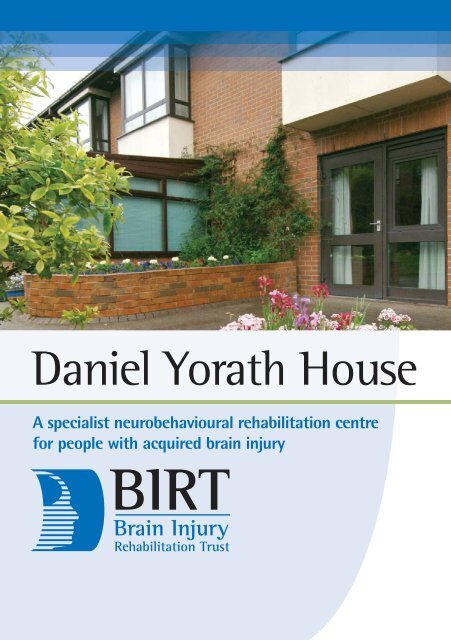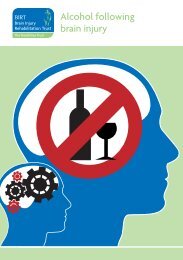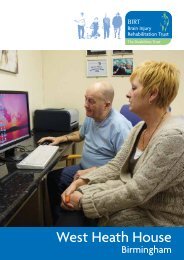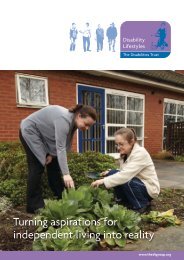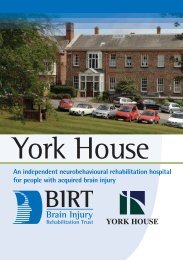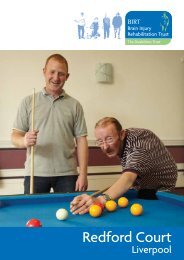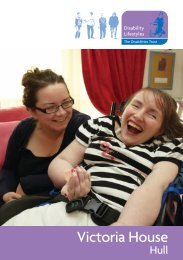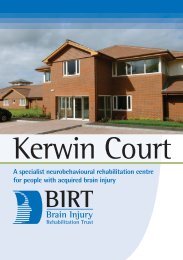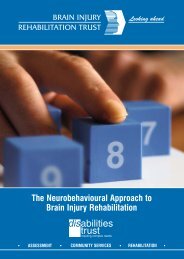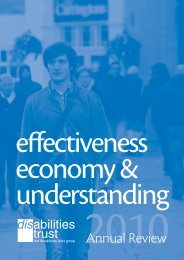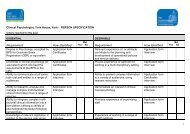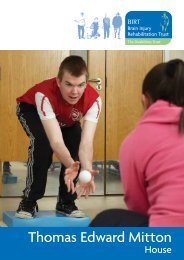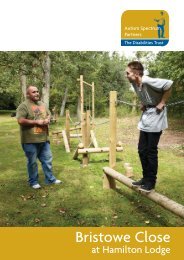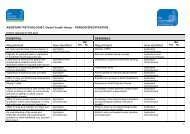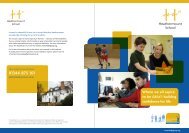BIRT Daniel Yorath House -1 - The Disabilities Trust
BIRT Daniel Yorath House -1 - The Disabilities Trust
BIRT Daniel Yorath House -1 - The Disabilities Trust
You also want an ePaper? Increase the reach of your titles
YUMPU automatically turns print PDFs into web optimized ePapers that Google loves.
<strong>Daniel</strong> <strong>Yorath</strong> <strong>House</strong>A specialist neurobehavioural rehabilitation centrefor people with acquired brain injury
ContentsWhat is <strong>Daniel</strong> <strong>Yorath</strong> <strong>House</strong>?..................................................................................................................1Facilities and environment.........................................................................................................................2Assessment and rehabilitation.................................................................................................................3Clinical practice and clinical team..........................................................................................................4Outcomes for service users.........................................................................................................................5Continuum of care.........................................................................................................................................6Quality and value for money......................................................................................................................7Case study..........................................................................................................................................................8Where we are...................................................................................................................................................9Contact information...................................................................................................................................10
What is <strong>Daniel</strong> <strong>Yorath</strong> <strong>House</strong>?Situated close to the city of Leeds, <strong>Daniel</strong> <strong>Yorath</strong> <strong>House</strong> isa specialist neurobehavioural rehabilitation centre forpeople with acquired brain injury. Opened in 1992, it wasone of the first assessment and rehabilitation centres forbrain injury in the UK. It forms part of the nationwidenetwork of rehabilitation support services provided by <strong>The</strong>Brain Injury Rehabilitation <strong>Trust</strong> (<strong>BIRT</strong>).What does it do?<strong>Daniel</strong> <strong>Yorath</strong> <strong>House</strong> works with people who have to cope with a range ofcognitive, physical and/or emotional symptoms following a severe brain injury. <strong>The</strong>rehabilitation is based on a neurobehavioural approach and focuses on enablingservice users to function more independently, develop their lives as they chooseand to participate in as many of their previous roles and activities as possible.Our aimWe aim to provide the best quality neurobehavioural rehabilitation forpeople with complex and challenging needs after brain injury.Ultimately, we want to enable service users to participate in life as fullyas possible, needing the least possible assistance.Professor Michael Oddy, Director of Clinical Services, <strong>BIRT</strong>www.birt.co.uk<strong>Daniel</strong> <strong>Yorath</strong> <strong>House</strong>, Leeds1
Facilities and environment<strong>Daniel</strong> <strong>Yorath</strong> <strong>House</strong> offers an outstanding setting for rehabilitation. All service usershave their own comfortable en-suite bedrooms, complemented by spacious andwell-appointed communal areas for dining and relaxation.Rehabilitation takes place in a modern, tranquil andsuperbly equipped environment, with service usersenjoying access to a wide range of therapeutic andrecreational facilities.Set in attractive landscaped grounds, <strong>Daniel</strong> <strong>Yorath</strong> <strong>House</strong> provides accommodationfor 23 service users. In addition to the main 19-bed residential centre there are twocommunity houses nearby where service users can maintain their rehabilitationgains (transitional support unit) and consolidate their skills (transitional living unit)in a community house, rather than a residential setting.Access to the wider community forms an important part of rehabilitation. Its closeproximity to shops and leisure facilities and easy access to Leeds and Wakefieldmake <strong>Daniel</strong> <strong>Yorath</strong> <strong>House</strong> ideally situated for social integration and also offersopportunities for education and work placements.Family support<strong>Daniel</strong> <strong>Yorath</strong> <strong>House</strong> operates a family support group for relatives of service users toprovide education and emotional support, both individually and within a group setting.2
Assessment and rehabilitationAssessmentWhen a service user is admitted to <strong>Daniel</strong> <strong>Yorath</strong> <strong>House</strong>they undergo a 12-week neurobehavioural assessment todetermine their potential for social reintegration andincreased independence.This includes assessments of, for example, cognitive skills, the nature and frequency ofany challenging behaviour and the service user’s ability to engage with thecommunity and complete functional daily tasks.At the end of the assessment period, a meeting is held at which family, funders and otherinvolved parties join the team to discuss the results. This enables the team to identify anybarriers to recovery and link these with a course of rehabilitation and support, whiletaking into account the aspirations of the service user and family members.RehabilitationIf a formal course of rehabilitation is recommended, the service user begins anindividualised treatment programme. This includes learning and therapeutic sessions,personal, social and domestic skills, guided leisure time, community access,behavioural management and vocational training and support.Rehabilitation goals take into account short, medium andlong-term aims, such as transfer to a more independentenvironment for ongoing rehabilitation. <strong>The</strong> average lengthof a placement varies, depending on individual need.www.birt.co.uk<strong>Daniel</strong> <strong>Yorath</strong> <strong>House</strong>, Leeds3
Clinical practice and clinical team<strong>The</strong> clinical team at <strong>Daniel</strong> <strong>Yorath</strong> <strong>House</strong> comprises professionals from a widerange of disciplines, all of whom are recognised in their field as having specialexpertise in the management of brain injury. <strong>The</strong> team is led by a consultant inneuropsychology and rehabilitation and includes clinical psychologists, speech andlanguage therapists, physiotherapists, occupational therapists, vocational trainersand rehabilitation support workers.Clinical practice is based on a neurobehavioural approach andfocuses on a combination of social and behaviouralinterventions to aid recovery of independence. <strong>The</strong> emphasisof assessment is on a systematic and structured observationof behaviour and skills in everyday situations and tasks.Clinical governance is promoted through <strong>BIRT</strong>’s Clinical Executive, a nationalforum comprising consultants in neuropsychology and rehabilitation from across<strong>BIRT</strong>’s services. Led by Professor Mike Oddy, the Clinical Executive is committed topromoting clinical governance, training and research, as well as developing andreviewing clinical policies and procedures.Accreditation<strong>Daniel</strong> <strong>Yorath</strong> <strong>House</strong> has been awarded full accreditation with the Commission forthe Accreditation of Rehabilitation Facilities (CARF) and is registered with the CareQuality Commission (CQC), receiving consistently excellent reports.4
Outcomes for service users“In our 2010 satisfaction survey 100% of referrers weresatisfied or more than satisfied with services provided,assessed over 12 key areas.”During 2010 <strong>Daniel</strong> <strong>Yorath</strong> <strong>House</strong> admitted 24 service users and discharged 30. Of these,75% moved into some form of supported community-based living following theirrehabilitation reflecting a reduction in costs in most cases.In 2010, 72% of our service users were admitted from residential care andjust 18% of service users were discharged to residential care. On admission65% of service users were not engaged in any productive activity, yet 86%of those discharged were involved in some type of productive activity,including sheltered or voluntary employment. At discharge, the level ofsocietal participation by service users had increased by 58%. Two thirds ofservice users were discharged within 6 months of admission.Ongoing monitoring of the severity of neurobehavioural symptoms following brain injuryis vital to the rehabilitation process. <strong>BIRT</strong> uses a series of standardised rating scales toassess cognitive, emotional and behavioural changes over time. Each service user isassessed during their first month of admission. <strong>The</strong>se results are then compared with thesame measurements sampled during the last month prior to discharge. This includesmonitoring of mood, behaviour and motivation, together with any demonstration ofverbal or physical aggression. As well as enabling us to measure service users’ progress,the outcome measurement system also acts as a valuable tool for individual goal settingduring the rehabilitation programme and informs the ongoing care pathway.Satisfaction ratingsEach year we ask service users, families and referrers to offer feedback on theirsatisfaction with our service. In 2010 89% of service users said they were happy with <strong>BIRT</strong>services. 100% of referrers said they were satisfied or more than satisfied with servicesprovided, assessed over 12 key areas. 86% of families told us they would recommend<strong>Daniel</strong> <strong>Yorath</strong> <strong>House</strong> to others, while 100% were very happy with staff courtesy andsupport for families.www.birt.co.uk<strong>Daniel</strong> <strong>Yorath</strong> <strong>House</strong>, Leeds 5
6Continuum of Care<strong>BIRT</strong> offers a nationwide continuum of services for people with acquired braininjury including post-acute hospital-based rehabilitation, assessment andrehabilitation, continuing rehabilitation and community support services. <strong>The</strong>duration of placements at <strong>Daniel</strong> <strong>Yorath</strong> <strong>House</strong> varies, depending on the serviceuser’s level of need and their potential for rehabilitation.
Quality and value for money<strong>BIRT</strong>’s continuum of care ensures that in most cases areduction in costs occurs as a service user moves towardsgreater independence. On average, the lifetime costsavings are between £800,000 and £1 million, if a serviceuser is admitted within one year of brain injury.*Reducing costs through the <strong>BIRT</strong> continuum - a case study:When Steven came to <strong>BIRT</strong>, any attempt to engage with him resulted in outburstsof violence and aggression. After moving through <strong>BIRT</strong>’s continuum of services,costs were reduced as follows:Challenging Behaviour Assessment and Rehabilitation Centre move toChallenging Behaviour Continuing Rehabilitation Centre= reduction of £750 per week (equating to £39k per year)Challenging Behaviour Continuing Rehabilitation Centre move toAssessment and Rehabilitation Centre= reduction of a further £438 per week (equating to £22K per year)Assessment and Rehabilitation Centre move toCommunity Supported Housing scheme= reduction of a further £712 per week (equating to £37K per year)<strong>The</strong> savings shown are the costs that would have been incurred had Steven notmoved through the <strong>BIRT</strong> continuum. Coupled with the high satisfaction ratingsfrom service users, families and referring agencies, research data confirms that<strong>BIRT</strong> delivers quality and value for money from admission to discharge.* Peer-reviewed research data references are available at www.birt.co.uk/valueformoneyFees correct at time of printwww.birt.co.uk<strong>Daniel</strong> <strong>Yorath</strong> <strong>House</strong>, Leeds7
Nigel Watson was found unconscious in 2001. He hadsustained a brain injury and he spent many months inhospital with severe cognitive and behavioural problems.After spending some time at our York <strong>House</strong> service where staff worked with Nigelto follow a neurorehabilitation model, Nigel moved into <strong>Daniel</strong> <strong>Yorath</strong> <strong>House</strong>where he was able to further develop independent living skills.During Nigel’s stay, a three-month placement in our Transitional Living Unit (TLU)was agreed to ensure consistency and consolidation of his skills and abilities. Staffworked with Nigel on helping him to control aggressive behaviour and develop hisindependence, which had been a barrier to independent living in the community.During Nigel’s trial in the TLU, his mood was stable and he engaged in activitiescontinuing to work on everyday tasks, increasing community access includinggoing to the driving range with a small group of other people currently in theservice and swimming on a fortnightly basis.Nigel was discharged to a <strong>BIRT</strong> Community Supported <strong>House</strong> in Kippax in 2010,following the success of his stay at <strong>Daniel</strong> <strong>Yorath</strong> <strong>House</strong>. Nigel’s pathway throughour continuum of care has resulted in cost savings and demonstrates howspecialist rehabilitation and care over time benefits the individual in many ways.8
Where we areSituated close to the cosmopolitan city of Leeds, with easy access to the A1 andM1, <strong>Daniel</strong> <strong>Yorath</strong> <strong>House</strong> has excellent rail and road links to all parts of the UK.Service Manager, <strong>Daniel</strong> <strong>Yorath</strong> <strong>House</strong>1 Shaw Close, Ninelands Lane, Garforth LS25 2HATel: 0113 2873871 | Fax: 0113 2873278 | Email: dyh@birt.co.ukFor further information about <strong>Daniel</strong> <strong>Yorath</strong> <strong>House</strong> please contact the ServiceManager at the address above.©2011 Google - Map data ©2011 Tele AtlasReferralsReferrals should be made directly to <strong>Daniel</strong> <strong>Yorath</strong> <strong>House</strong>. We accept referrals from awide range of agencies including health, social services, medico-legal and otherspecialist providers.www.birt.co.uk<strong>Daniel</strong> <strong>Yorath</strong> <strong>House</strong>, Leeds9
<strong>The</strong> Brain Injury Rehabilitation <strong>Trust</strong><strong>The</strong> Brain Injury Rehabilitation <strong>Trust</strong> (<strong>BIRT</strong>) provides a continuum of carefor people with acquired brain injury, from post-acute hospital basedrehabilitation, assessment and rehabilitation, continuing rehabilitationand supported housing and home support. Through our range of specialistservices, we aim to enable people to function more independently in the widercommunity and develop their lives in ways they choose.For more information about our work please contact:<strong>The</strong> Brain Injury Rehabilitation <strong>Trust</strong>60 Queen Street, Normanton, Wakefield, WF6 2BUTel: 01924 896100 | Fax: 01924 899264 | Email: director@birt.co.uk<strong>The</strong> Brain Injury Rehabilitation <strong>Trust</strong> is a division of <strong>The</strong> <strong>Disabilities</strong> <strong>Trust</strong> and themeans by which it provides its brain injury services.Founded in 1979, <strong>The</strong> <strong>Disabilities</strong> <strong>Trust</strong> is now establishedas one of the UK’s leading charities, offering imaginative,progressive services to people with autism, brain injury,physical disability and learning disability.<strong>The</strong> <strong>Disabilities</strong> <strong>Trust</strong>First Floor, 32 Market Place, Burgess Hill, West Sussex RH15 9NPTel: 01444 239123 | Fax: 01444 244978 | Email: info@thedtgroup.org10If you would like to help us by fundraising for <strong>The</strong> <strong>Disabilities</strong> <strong>Trust</strong>, <strong>BIRT</strong> or thisservice, please call us on 01444 237286, email fundraising@thedtgroup.org,or visit our website for more information.


